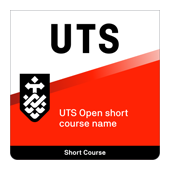Key benefits of this short course
By the end of this short course, participants should be able to:
- Evaluate strategic planning concepts and approaches and their application to their work contexts
- Explain the concept of public value and its relevance to governance
- Evaluate tools for effective strategic planning such as visioning, strategic thinking, systems thinking; and analyse ways in which these tools might benefit strategic planning in their professional practice
- Analyse the factors that shape strategic planning and organisational frameworks including social, cultural, economic and political drivers of change
- Demonstrate strategic thinking about future focused scenarios
- Evaluate ways to advocate and partner with a range of stakeholders to achieve strategic outcomes
- Develop creative solutions to complex problems based on strategy, research and evaluation.
Digital badge and certificate

A digital badge and certificate will be awarded following the successful completion of any necessary tasks or assessments to demonstrate acquired learning of the short course or for meeting attendance and/or participation requirements.
Learn more about UTS Open digital badges.
Course outline
There are 5 modules in the course, covering the following content:
- Strategic theory - review of local, national and international strategic planning frameworks; exploration of the language of strategic planning and key strategic planning and strategic management research
- Strategic planning approaches & tools - the practice of strategic planning in government, non-government and private sector contexts; evaluation and critique of current approaches and tools
- Strategic planning in context - the external environment and its impacts upon organisational culture and structure
- Strategic management implementation - ways of engaging stakeholders and the community in the implementation of desired outcomes
- Strategic management reporting and review - reviewing and reassessing a strategic planning vision and desired outcomes in consultation with stakeholders, clients and the community.
Price
Full price: $2,875 (GST-free)*
*Price subject to change. Please check price at time of purchase.
Discounts are available for this course. For further details and to verify if you qualify, please check the Discounts section.
Discounts
Discounts are available for this course as follows:
- 10% discount for UTS staff, alumni and students
Discounts cannot be combined and only one discount can be applied per person per course session. Discounts can only be applied to the full price. Discounts cannot be applied to any offered special price.
How to enrol and obtain your UTS staff, alumni or student discount
Please contact the team at support@open.uts.edu.au with either your staff or student number.
If you are eligible for a UTS alumni or student discount, please ensure you have provided your UTS student number during checkout.
If you are an alumni and have forgotten your UTS student number, email support@open.uts.edu.au with your full name, UTS degree and year of commencement.
Enrolment conditions
Course purchase is subject to UTS Open Terms and Conditions.
Contact us
For any questions on enrolment or payment, please email support@open.uts.edu.au
If you have a specific question on course content or requirements, please email ippg.learning@uts.edu.au

















